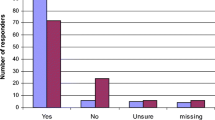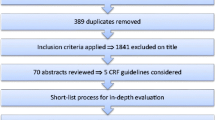Abstract
Purpose
This study aims to identify the current practices of health professionals in the assessment and treatment of cancer-related fatigue (CRF).
Methods
Health professionals working with oncology clients participated in an electronic survey distributed via professional associations and oncology societies.
Results
One hundred twenty-nine professionals from nursing, medical, and allied health disciplines participated in an electronic survey. Overall, there was a perception that CRF was inadequately managed at some facilities. Routine fatigue screening processes in the workplace were reported by more than half of participants; however, less than one quarter used a clinical guideline or conducted in-depth CRF assessments. Awareness of interventions for CRF varied amongst participants with one quarter able to list five appropriate interventions for cancer-related fatigue. Access to services for managing fatigue was inconsistent across service types, with post-treatment triage a high priority for CRF in some organisations yet not others. Participants identified a need for improved guidelines, enhanced expertise and better access to services for people with CRF.
Conclusions
There is a need for further education in CRF management for a range of health disciplines in oncology and additional resources to facilitate translation of CRF guidelines into clinical practice.

Similar content being viewed by others
References
National Comprehensive Cancer Network (2015) Cancer-related fatigue version 1.2015. http://www.nccn.org/professionals/physician_gls/pdf/fatigue.pdf. Accessed 19/1/2015
Berger AM, Gerber LH, Mayer DK (2012) Cancer-related fatigue. Implications for breast cancer survivors. Cancer 118(S8):2261–2269. doi:10.1002/cncr.27475
Hilarius DL, Kloeg PH, van der Wall E, Komen M, Gundy CM, Aaronson NK (2011) Cancer-related fatigue: clinical practice versus practice guidelines. Support Care Cancer 19(4):531–538. doi:10.1007/s00520-010-0848-3
Borneman T, Piper BF, Sun VC, Koczywas M, Uman G, Ferrell B (2007) Implementing the fatigue guidelines at one NCCN member institution: process and outcomes. J Natl Compr Cancer Netw 5 (10):1092–1101. doi:http://www.jnccn.org/content/5/10/1092.short
Piredda M, De Marinis MG, Rocci L, Gualandi R, Tartaglini D, Ream E (2007) Meeting information needs on cancer-related fatigue: an exploration of views held by Italian patients and nurses. Support Care Cancer 15(11):1231–1241. doi:10.1007/s00520-007-0240-0
Howell D, Keller-Olaman S, Oliver TK, Hack TF, Broadfield L, Biggs K, Chung J, Gravelle D, Green E, Hamel M, Harth T, Johnston P, McLeod D, Swinton N, Syme A, Olson K (2013) A pan-Canadian practice guideline and algorithm: screening, assessment, and supportive care of adults with cancer-related fatigue. Curr Oncol 20(3):e233–e246. doi:10.3747/co.20.1302
Willis GB (2005) Cognitive interviewing: a tool for improving questionnaire design. Sage Publications, California
Büttner P, Muller R (2011) Epidemiology. Oxford University Press, Australia
Joffe H, Yardley L (2004) Content and thematic analysis. In: Marks DF, Yardley L (eds) Research methods for clinical and health psychology. Sage Publications Ltd, Great Britain, pp 56–66. doi:10.4135/9781849209793
Elo S, Kyngäs H (2008) The qualitative content analysis process. J Adv Nurs 62(1):107–115. doi:10.1111/j.1365-2648.2007.04569.x
Mendoza TR, Wang XS, Cleeland CS, Morrissey M, Johnson B, Wendt JK, Huber SL (1999) The rapid assessment of fatigue severity in cancer patients—use of the Brief Fatigue Inventory. Cancer 85:1186–1196. doi:10.1002/(SICI)1097-0142(19990301)85:5<1186::AID-CNCR24>3.0.CO;2-N
Abernethy A, Shelby-James T, Fazekas B, Woods D, Currow D (2005) The Australia-modified Karnofsky Performance Status (AKPS) scale: a revised scale for contemporary palliative care clinical practice [ISRCTN81117481]. BMC Palliat Care 4:7. doi:10.1186/1472-684X-4-7
Donnelly C, Lowe-Strong A, Rankin J, Campbell A, Allen J, Gracey J (2010) Physiotherapy management of cancer-related fatigue: a survey of UK current practice. Support Care Cancer 18(7):817–825. doi:10.1007/s00520-009-0715-2
Abdalrahim MS, Herzallah MS, Zeilani RS, Alhalaiqa F (2014) Jordanian nurses’ knowledge and attitudes toward cancer-related fatigue as a barrier of fatigue management. J Am Sci 10 (2):191–197. doi:http://www.jofamericanscience.org/journals/am-sci/am1002/
Yilmaz HB, Taş F, Muslu GK, Başbakkal Z, Kantar M (2010) Health professionals’ estimation of cancer-related fatigue in children. J Pediatr Oncol Nurs 27(6):330–337. doi:10.1177/1043454210377176
de Raaf PJ, de Klerk C, Timman R, Busschbach JJ, Oldenmenger WH, van der Rijt CD (2013) Systematic monitoring and treatment of physical symptoms to alleviate fatigue in patients with advanced cancer: a randomized controlled trial. J Clin Oncol 31(6):716–723. doi:10.1200/JCO.2012.44.4216
Cramp F, Byron-Daniel J (2012) Exercise for the management of cancer-related fatigue in adults. Cochrane DB Sys Rev (11). doi:10.1002/14651858.CD006145.pub3
Brown JC, Huedo-Medina TB, Pescatello LS, Pescatello SM, Ferrer RA, Johnson BT (2011) Efficacy of exercise interventions in modulating cancer-related fatigue among adult cancer survivors: a meta-analysis. Cancer Epidemiol Biomark 20(1):123–133. doi:10.1158/1055-9965.EPI-10-0988
Kangas M, Bovbjerg DH, Montgomery GH (2008) Cancer-related fatigue: a systematic and meta-analytic review of non-pharmacological therapies for cancer patients. Psychol Bull 134(5):700–741. doi:10.1037/a0012825
Goedendorp MM, Gielissen MFM, Verhagen CAHHVM, Bleijenberg G (2009) Psychosocial interventions for reducing fatigue during cancer treatment in adults. Cochrane DB Sys Rev (1). doi:10.1002/14651858.CD006953.pub2
Gibson F, Edwards J, Sepion B, Richardson A (2006) Cancer-related fatigue in children and young people: Survey of healthcare professionals’ knowledge and attitudes. Eur J Oncol Nurs 10(4):311–316. doi:10.1016/j.ejon.2005.09.010
Brook RH (1989) Practice guidelines and practicing medicine: are they compatible? JAMA 1(21):3027–3030. doi:10.1001/jama.1989.03430210069032
Woolf S, Schunemann HJ, Eccles MP, Grimshaw JM, Shekelle P (2012) Developing clinical practice guidelines: types of evidence and outcomes; values and economics, synthesis, grading, and presentation and deriving recommendations. Implement Sci 7:61. doi:10.1186/1748-5908-7-61
Harrison MB, Légaré F, Graham ID, Fervers B (2010) Adapting clinical practice guidelines to local context and assessing barriers to their use. Can Med Assoc J 182(2):E78–E84. doi:10.1503/cmaj.081232
IOM (Institute of Medicine) (2011) Clinical practice guidelines we can trust. The National Academies Press, Washington, DC. doi:http://nap.edu/catalog/13058.htm
Prior M, Guerin M, Grimmer‐Somers K (2008) The effectiveness of clinical guideline implementation strategies—a synthesis of systematic review findings. J Eval Clin Pract 14(5):888–897. doi:10.1111/j.1365-2753.2008.01014.x
Piper BF, Borneman T, Sun VC-Y, Koczywas M, Uman G, Ferrell B, James RL (2008) Cancer-related fatigue: role of oncology nurses in translating National Comprehensive Cancer Network assessment guidelines into practice. Clin J Oncol Nurs 12(5,Suppl):37–47. doi:10.1188/08.CJON.S2.37-47
Owens DK, Qaseem A, Chou R, Shekelle P (2011) High-value, cost-conscious health care: concepts for clinicians to evaluate the benefits, harms, and costs of medical interventions. Ann Intern Med 154(3):174–180. doi:10.7326/0003-4819-154-3-201102010-00007
Escalante CP, Kallen MA, Valdres RU, Morrow PK, Manzullo EF (2010) Outcomes of a cancer-related fatigue clinic in a comprehensive cancer center. J Pain Symptom Manage 39(4):691–701. doi:10.1016/j.jpainsymman.2009.09.010
Dainesi SM, Goldbaum M (2012) E-survey with researchers, members of ethics committees and sponsors of clinical research in Brazil: an emerging methodology for scientific research. Rev Bras Epidemiol 15(4):705–713. doi:10.1590/S1415-790X2012000400003
Simsek Z, Veiga JF (2000) The electronic survey technique: an integration and assessment. Organ Res Methods 3(1):93–115. doi:10.1177/109442810031004
Acknowledgements
The authors thank Dr. Marilyn di Stefano for supervision in the design stage of this study, the six professional societies that distributed the survey and the health professionals who participated in cognitive interviews and the survey.
Conflict of interest
None. Authors have full control of all primary data, and this will be made available to Supportive Care in Cancer if requested.
Author information
Authors and Affiliations
Corresponding author
Rights and permissions
About this article
Cite this article
Pearson, E.J.M., Morris, M.E. & McKinstry, C.E. Cancer-related fatigue: a survey of health practitioner knowledge and practice. Support Care Cancer 23, 3521–3529 (2015). https://doi.org/10.1007/s00520-015-2723-8
Received:
Accepted:
Published:
Issue Date:
DOI: https://doi.org/10.1007/s00520-015-2723-8




